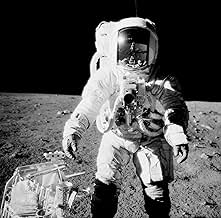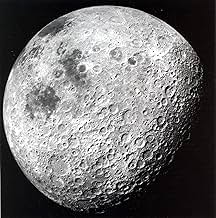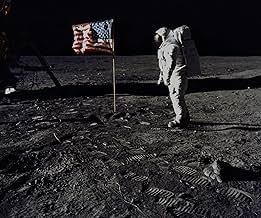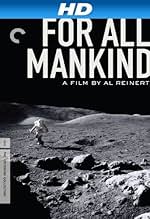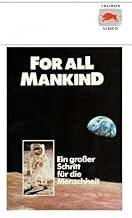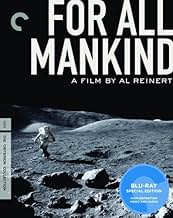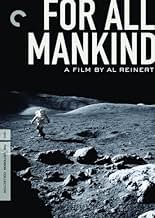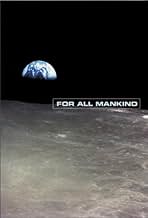VALUTAZIONE IMDb
8,1/10
6882
LA TUA VALUTAZIONE
Un sguardo in profondità alle varie missioni di atterraggio lunare della NASA, partendo dall'Apollo 8.Un sguardo in profondità alle varie missioni di atterraggio lunare della NASA, partendo dall'Apollo 8.Un sguardo in profondità alle varie missioni di atterraggio lunare della NASA, partendo dall'Apollo 8.
- Candidato a 1 Oscar
- 3 vittorie e 3 candidature totali
Jim Lovell
- Narrator - Apollo 8, Apollo 13
- (voce)
- (as James A. Lovell Jr.)
Ken Mattingly
- Narrator - Apollo 16
- (voce)
- (as T. Kenneth Mattingly II)
Russell Schweickart
- Narrator - Apollo 9
- (voce)
- (as Russell L. Schweickart)
Eugene Cernan
- Narrator - Apollo 10, Apollo 17
- (voce)
- (as Eugene A. Cernan)
Charles Conrad
- Narrator - Apollo 12
- (voce)
- (as Charles P. Conrad Jr.)
Richard Gordon
- Narrator - Apollo 12
- (voce)
- (as Richard F. Gordon Jr.)
Alan Bean
- Narrator - Apollo 12
- (voce)
- (as Alan L. Bean)
Jack Swigert
- Narrator - Apollo 13
- (voce)
- (as John L. Swigert Jr.)
Stuart Roosa
- Narrator - Apollo 14
- (voce)
- (as Stuart A. Roosa)
James Irwin
- Narrator - Apollo 15
- (voce)
- (as James B. Irwin)
Charles Duke
- Narrator - Apollo 16
- (voce)
- (as Charles M. Duke Jr.)
Harrison Schmitt
- Narrator - Apollo 17
- (voce)
- (as Harrison H. Schmitt)
Buzz Aldrin
- Self
- (filmato d'archivio)
Bill Anders
- Self
- (filmato d'archivio)
Neil Armstrong
- Self
- (filmato d'archivio)
Stephen Bales
- Self
- (filmato d'archivio)
- (as Steve Bales)
Frank Borman
- Self
- (filmato d'archivio)
Recensioni in evidenza
I won't reiterate all of the praise of this film except to say that if I had just few more spare dollars when it was released on laserdisc, I would have bought a laserdisc player just for this title (and 2001). Fortunately years later I've already purchased a DVD player and For All Mankind has finally been released on that format.
To me the defining moment of this film is the lunar lander slowly returning to the command module. At first we only see the cratered surface of the Moon moving below at incredible speed. Then we see a tiny motionless speck above it. Was it a defect in the lens? Of course not. It's the lunar lander slowly returning from the surface. It seems to take much longer than it really does because there are no cuts and no narrator explaining what we already know we're seeing. There's only a dot turning into a space ship. What more could you add to this amazing sight?
To me the defining moment of this film is the lunar lander slowly returning to the command module. At first we only see the cratered surface of the Moon moving below at incredible speed. Then we see a tiny motionless speck above it. Was it a defect in the lens? Of course not. It's the lunar lander slowly returning from the surface. It seems to take much longer than it really does because there are no cuts and no narrator explaining what we already know we're seeing. There's only a dot turning into a space ship. What more could you add to this amazing sight?
In a project almost more ambitious than the Apollo program itself, Al Reinert distills six million feet of NASA film footage and over 80 hours of taped interviews into a glorious 90- minute flashback to the ultimate achievement of our time: the manned exploration of another world. The film condenses all ten Apollo moon shots into a single flight, using only the genuine sights, sounds, and impressions experienced by the astronauts themselves along the way, from the tension and exhilaration of lift off to the joy (and inconvenience) of zero gravity, and from the loneliness of deep space to the wonder of stepping foot on an alien world. Seeing the footage for the first time on a big screen can be a revelation; it's a thrilling, vicarious journey across a new threshold in human evolution, providing both an argument for the continued human exploration of the cosmos and a timely reminder of how precious life on our own planet is.
I saw this film at a very, very young age and I suspect that it is the reason I developed a heavy interest in space exploration. I recently saw this again for the first time in many years since all I had was a vague recollection of it. And after watching many times since then I have no problem saying that this is one of the best documentaries ever made.
One must give the film's director, Al Reinert, at a ton of credit for his work. Who else could have come up with the brilliant notion behind this film? Who would have thought of taking footage from all of the Apollo missions (and a couple of the Gemini missions) and combining them with the words of the men who went where no one had (or has since) gone before? (Apologies for paraphrasing Star Trek) The genius of this film is that it shuns away from traditional documentary styling. Instead of compiling facts on one mission and having a well known actor/actress do the narration, the film lets those who went tell the story. Who else is better qualified? They might not be professional actors, but the astronauts don't need to be. It is the power of the events they describe that is the main reason for their presence. They are a powerful voice in this story.
In many reviews I have read, I have seen complaints about the mixing of footage or the use of footage out of its context (a Gemini reentry used for the TLI burn for example). Yes the mixing is nowhere near subtle and is, thus, blatantly obvious. But it is my feeling that this mixing was necessary. The only way to get across the story of Apollo's achievement to the average person was to mix the footage. Does it really matter in the end? I mean by that this: the film isn't about a single mission to the Moon. No, the power of Apollo lies not in each mission, but in the overall effect of the Apollo program. This film is about the journey of Apollo, the effect in had on the astronauts, and the effect it had on us all.
If there is one element of this film that really stayed with men it was the music. It is among the most beautiful and haunting things you will ever here. Brian Eno does a marvelous job of conveying the mystery and majesty of both space and the Moon. This is one of those scores who really have to hear to believe.
For All Mankind, perhaps better then anything else out there, demonstrates the power of humanity in space. For one to really appreciate this film it needs to be seen on a large screen in surround sound. Only then can one appreciate both the film and the power of the Apollo legacy. This is the first film I've seen that I recommend to everyone. This is a film that is truly "For All Mankind".
One must give the film's director, Al Reinert, at a ton of credit for his work. Who else could have come up with the brilliant notion behind this film? Who would have thought of taking footage from all of the Apollo missions (and a couple of the Gemini missions) and combining them with the words of the men who went where no one had (or has since) gone before? (Apologies for paraphrasing Star Trek) The genius of this film is that it shuns away from traditional documentary styling. Instead of compiling facts on one mission and having a well known actor/actress do the narration, the film lets those who went tell the story. Who else is better qualified? They might not be professional actors, but the astronauts don't need to be. It is the power of the events they describe that is the main reason for their presence. They are a powerful voice in this story.
In many reviews I have read, I have seen complaints about the mixing of footage or the use of footage out of its context (a Gemini reentry used for the TLI burn for example). Yes the mixing is nowhere near subtle and is, thus, blatantly obvious. But it is my feeling that this mixing was necessary. The only way to get across the story of Apollo's achievement to the average person was to mix the footage. Does it really matter in the end? I mean by that this: the film isn't about a single mission to the Moon. No, the power of Apollo lies not in each mission, but in the overall effect of the Apollo program. This film is about the journey of Apollo, the effect in had on the astronauts, and the effect it had on us all.
If there is one element of this film that really stayed with men it was the music. It is among the most beautiful and haunting things you will ever here. Brian Eno does a marvelous job of conveying the mystery and majesty of both space and the Moon. This is one of those scores who really have to hear to believe.
For All Mankind, perhaps better then anything else out there, demonstrates the power of humanity in space. For one to really appreciate this film it needs to be seen on a large screen in surround sound. Only then can one appreciate both the film and the power of the Apollo legacy. This is the first film I've seen that I recommend to everyone. This is a film that is truly "For All Mankind".
This was effective for this viewer. Usually what that means in cases like this is that it made me cry.
The hook is that it reviews its subject through the eyes of the astronauts. I was wary of this. I got involved in the program later, during the beginning of the shuttle era and even then the astronauts were pretty much there only to have been taken there. They were chosen some of them for how good they looked on newsprint.
The magic of the program and its heroes were a few visionaries and an army of competent engineers.
Yet it was effective because we see the story through the eyes of witnesses. There role here is simply as witness, and if you were alive during this time, you will be impressed at how it affects you.
There were all sorts of paths that could have been followed in this. The quest of man to explore; the mysteries of the unknown; the vast game being played by two enemies to demonstrate superiority of ideology; the hidden weapons programs.
They cover all these slightly except that last, and that's excusable because these witnesses saw none of that. But the story that dominates is the Kennedy one. Its hard to imagine today, but we loved our president and he deserved it. He was intelligent and articulate. His advisers came off not as louts or bullies, but men (and a few women) smart enough for difficult times. He was the Peace Corps president.
Kennedy promised to go to the moon and return without consulting anyone at NASA, and riding on the crest of a national enthusiasm for science and hardware. The nation really was engaged. And then he was killed, and with our rising self-doubt (Vietnam, race) we decided that as a people we owed it to him, or what he stood for. So when it happened, and the world watched, re affirmed the man and what he stood for. It was a good feeling, not pride as much as wonder about who we discovered ourselves to be.
This will evoke that same feeling again, the original tears, followed by tears of disappointment at the massive collapse of esteem which followed. A serious of botched opportunities to be worthy of the accomplishment.
Its an effective documentary in that regard, all the more so since everything was designed to be photographed, and was. If you really want to learn of this program, you need to go elsewhere, But this delivers on the promise.
Ted's Evaluation -- 3 of 3: Worth watching.
The hook is that it reviews its subject through the eyes of the astronauts. I was wary of this. I got involved in the program later, during the beginning of the shuttle era and even then the astronauts were pretty much there only to have been taken there. They were chosen some of them for how good they looked on newsprint.
The magic of the program and its heroes were a few visionaries and an army of competent engineers.
Yet it was effective because we see the story through the eyes of witnesses. There role here is simply as witness, and if you were alive during this time, you will be impressed at how it affects you.
There were all sorts of paths that could have been followed in this. The quest of man to explore; the mysteries of the unknown; the vast game being played by two enemies to demonstrate superiority of ideology; the hidden weapons programs.
They cover all these slightly except that last, and that's excusable because these witnesses saw none of that. But the story that dominates is the Kennedy one. Its hard to imagine today, but we loved our president and he deserved it. He was intelligent and articulate. His advisers came off not as louts or bullies, but men (and a few women) smart enough for difficult times. He was the Peace Corps president.
Kennedy promised to go to the moon and return without consulting anyone at NASA, and riding on the crest of a national enthusiasm for science and hardware. The nation really was engaged. And then he was killed, and with our rising self-doubt (Vietnam, race) we decided that as a people we owed it to him, or what he stood for. So when it happened, and the world watched, re affirmed the man and what he stood for. It was a good feeling, not pride as much as wonder about who we discovered ourselves to be.
This will evoke that same feeling again, the original tears, followed by tears of disappointment at the massive collapse of esteem which followed. A serious of botched opportunities to be worthy of the accomplishment.
Its an effective documentary in that regard, all the more so since everything was designed to be photographed, and was. If you really want to learn of this program, you need to go elsewhere, But this delivers on the promise.
Ted's Evaluation -- 3 of 3: Worth watching.
This film is a retelling of arguably one of the greatest achievements of the human race. In summer 1969, on a bright sunny morning, a group of astronauts led by commander Neil Armstrong climbed into the Saturn V rocket ready for its first flight. Not even 70 years had passed since planes had been invented. About 1 million people had gathered at the Kennedy Space Center in Florida to witness the once in a lifetime event, and millions more watched the entire thing on television. This film attempts to recapture some of that excitement that must have been everywhere on that day. It features interviews with the people who were brave enough to leave Earth in order to visit a place that has always watched over humanity, quite literally. At some points, it feels almost like a horror movie because nobody in the rocket or back on Earth knew if the thing would just blow up in flight for no reason, and the inside of the rocket module looks incredibly small. One of the astronauts says how strange of an experience it was and how going to the moon isn't like travelling to any other place, because when you travel somewhere, you have various landmarks to tell how far you got. On the moon mission, he says you leave Earth, pass an unimaginably large area of absolutely nothing for a few days, and suddenly, you're at the moon. There is nothing in between. The fact that the moon is only about a quarter of a million miles from Earth while stars are so far away you couldn't reach them even if you travelled your whole life makes it even more daunting. After the module lands on the surface, Neil says his famous line, and we see more very impressive shots of what the surface of the moon looks like. It has a depressing feel to it because the only colors are gray and black, but at the same time, it has a triumphant feel. The moon has been waiting thousands of years for people to go there, and the men reflect this by saying even though they knew they might not come back, they felt at home there. The soundtrack for this movie also gives it a sad feel that makes you realize how vast and empty space is. They show many things that seem unbelievable, even to experienced astronauts, such as small dots of light on the African continent (they're actually fires started by tribes), and having their food float in zero gravity when they're trying to eat. This is something that everyone should see at least once, because it discusses one of humanity's biggest accomplishments. To this day it's strange to think it was done in the 60s. Not many people have been to space, so you will be amazed watching this.
Lo sapevi?
- QuizThe staging footage was captured because NASA wanted to document the flight process of an unmanned Saturn flight for feedback in case there was a failure for engineers to look at footage to see what went wrong. Cameras were mounted in strategic locations, kicking on at critical moments to document the staging process for less than half a minute. After completion, the light-tight canisters containing the exposed film were jettisoned, dropping to earth with homing beacons and parachutes inside protective heat shields. Air Force C-130 transport planes, towing gigantic nets, recovered the canisters in the southern Atlantic Ocean.
- BlooperThe opening of the documentary incorrectly states that: "During the four year between December 1968 and November 1972, there were nine manned flights to the moon." The last lunar mission, Apollo 17, took place in December 1972.
- Citazioni
Charles M. Duke Jr.: The only bad part about zero gravity in Apollo was goin' to the bathroom. We had a very crude system. For your feces it was a bag, and you put this bag in the right position. So you go, but the only thing is that nothing goes to the bottom of the bag in zero gravity.
- Curiosità sui creditiFilmed on location by the United States National Aeronautics and Space Administration.
- Colonne sonoreSirens
Courtesy of Opal Records (Music For Films III)
Written and Performed by Daniel Lanois and Brian Eno
Licensed by Upala Music/Hamstein (BMI)
I più visti
Accedi per valutare e creare un elenco di titoli salvati per ottenere consigli personalizzati
- How long is For All Mankind?Powered by Alexa
Dettagli
- Data di uscita
- Paese di origine
- Lingua
- Celebre anche come
- National Geographic: For All Mankind
- Luoghi delle riprese
- Sea of Tranquility, The Moon, Space(Apollo 11 landing site)
- Aziende produttrici
- Vedi altri crediti dell’azienda su IMDbPro
Botteghino
- Lordo Stati Uniti e Canada
- 770.132 USD
- Fine settimana di apertura Stati Uniti e Canada
- 33.777 USD
- 5 nov 1989
- Lordo in tutto il mondo
- 770.366 USD
- Tempo di esecuzione1 ora 20 minuti
- Colore
- Mix di suoni
- Proporzioni
- 1.37 : 1
Contribuisci a questa pagina
Suggerisci una modifica o aggiungi i contenuti mancanti

Divario superiore
By what name was For All Mankind (1989) officially released in India in English?
Rispondi


